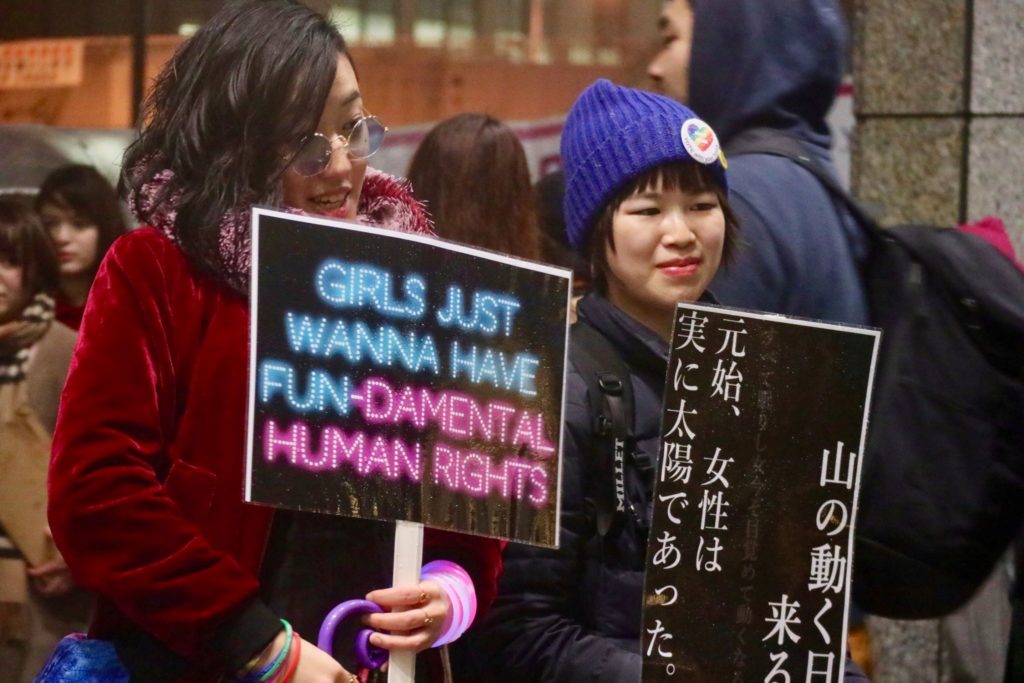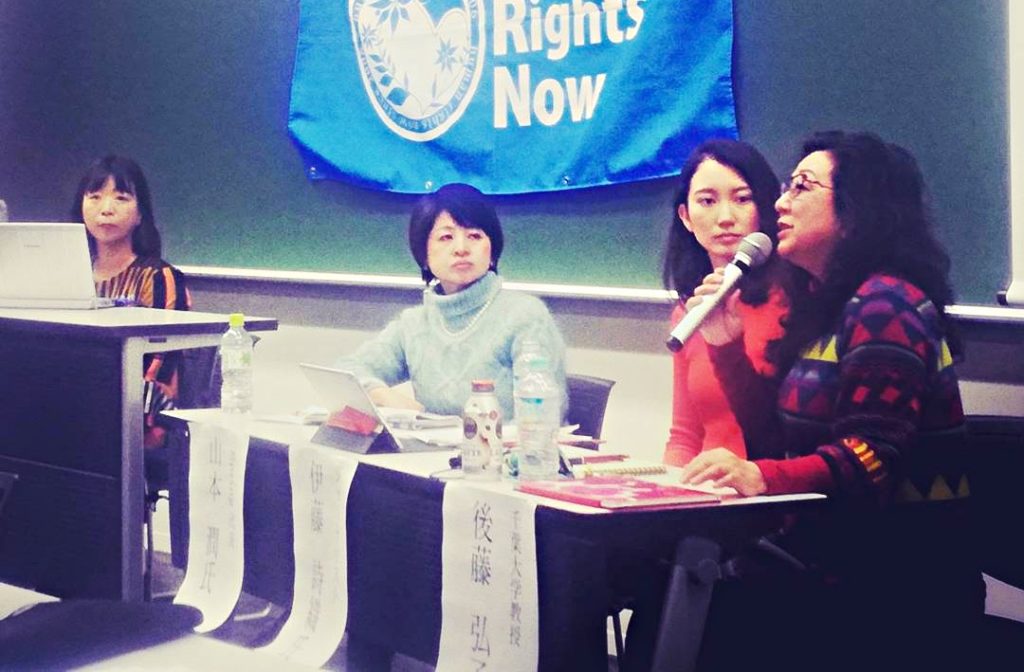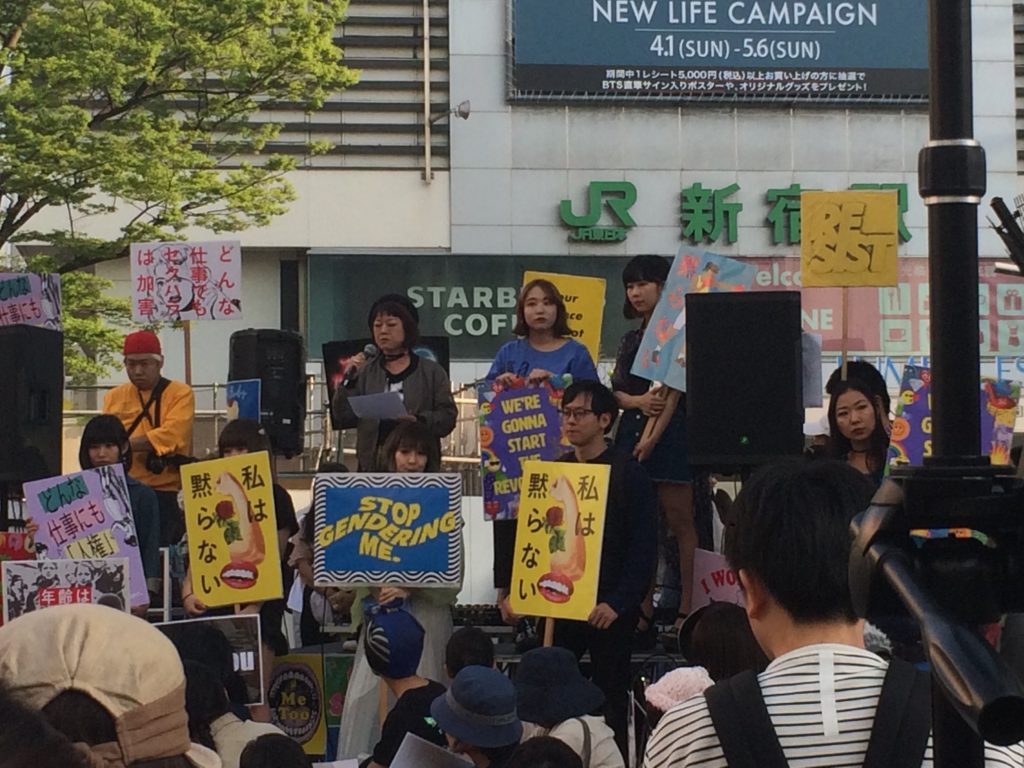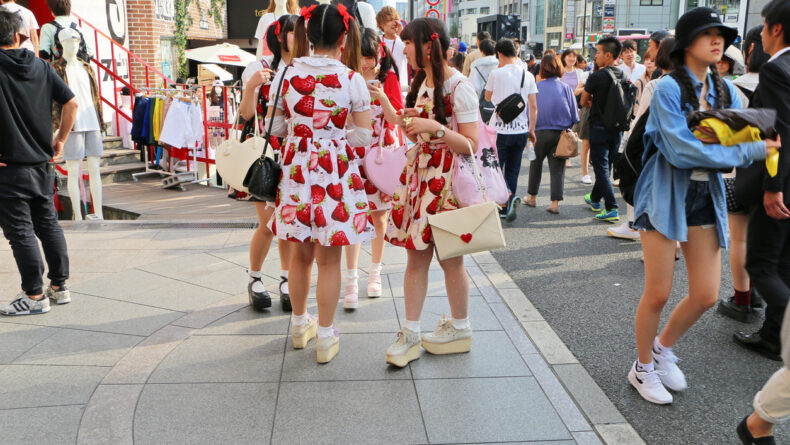4 Of The Most Powerful (To Date) Feminist Movements In Japan
The Voices against Japan’s culture of silence and submission
As controversies continue to emerge, women in Japan are telling their stories of sexism and survival everywhere from social media to the supreme court.
Japan, like much of the rest of the world, has had its share of recent controversies involving women’s issues. A young journalist was raped and even though all evidence pointed at her assailant, police dropped the charges for no evident reason. A major medical university admitted to altering the grades of female applicants to decrease their enrollment. The country’s sole female Cabinet member was forced to change her outfit because what she wore to the Cabinet’s declaration ceremony was deemed inappropriate (her skirt and jacket were different colors). That’s just 2018 alone.
Such circumstances are dire for women and those who identify as such. Yet activists and entire movements have emerged to counteract these acts of prejudice. In a country where people are generally discouraged from sharing their opinions too loudly, some are speaking up — even though the mainstream media may not be fully representing their voices. Here are some of the key female figures leading the charge against social injustice in Japan.
1. The artist who questioned the meaning of obscenity
A few years ago, an artist named Megumi Igarashi, aka Rokudenashiko, (which means “Good for Nothing Girl”) was arrested and accused of obscenity for creating art pieces inspired by her vulva. The imagery wasn’t at all sexual or even obviously modeled after the female anatomy. So what was the problem?
The issue is Article 175 of Japan’s penal code. Strictly forbidding the sale, distribution, and display of any “obscene” material, this has come to prohibit anything showing pubic hair and genitalia. In a country where porn is displayed on the shelves of every convenience store and schoolgirls in uniform are fetishized to an alarming degree, this may come as a surprise. It certainly confused the comic book artist and sculptor when her work began to get a lot of negative attention.
In a country where people are generally discouraged from sharing their opinions too loudly, some are speaking up.
Rokudenashiko gained notoriety for “Deco-man” (a portmanteau of “decorated manko,” the Japanese word for pussy), blinged out molds of her vulva that transform her folds into various landscapes. She started for fun, but as her work started to receive criticism, she took on a more feminist agenda. People’s reactions shocked her. Many balked at the mere mention of a pussy while others — typically older men — leered at her and called her dirty for showing off her parts. This disturbed Rokudenashiko. Most people born into this world enter it from a vagina, so she was confused how something so important could be “dirty.”
In 2014, she successfully crowdfunded a campaign to 3D print and sail in a kayak modeled after her vagina. One of the rewards granted to backers of the project was a 3D map of her vulva that could be used to create more art. It was the distribution of this data that violated the obscenity law and landed Igarashi in jail. She got out shortly after but was charged a fine.
She took the case to court, enraged at her lack of freedom as an artist. The trial revealed to her even more unfairness surrounding how women’s bodies are viewed. Igarashi wasn’t even allowed to say “manko” on television or in court.
View this post on Instagram
She published a manga called “What is Obscenity?” (ワイセツって何ですか? Waisetsu tte nan desuka, pictured above) about the whole debacle, later translated into English and read around the world. She believes people don’t respond well to anger or antagonism, so she keeps her work amusing and adorable. Even after the Tokyo high court upheld the guilty verdict and fined her, even more, her spirits were high. Her story features in the 2018 documentary Of Love and Law about the openly gay lawyers who represented her in court. It’s clear from her blog and social media posts that Rokudenashiko refuses to give up the fight.
2. The feminist writer who founded the first female-owned sex toy shop as a safe space for women
Another woman trying to break the taboos surrounding the female anatomy is Minori Kitahara.
Kitahara started Love Piece Club, the first female-owned adult goods store in Japan, in 1996. She had created a vibrator and was looking to sell it, but discovered there were no sex shops owned by women — so she opened her own. An outspoken writer passionate about sexual health, Kitahara was inspired by the Japanese women’s lib movement of the 1970s and other famous feminists to create her shop as a safe, empowering refuge for and by women.
Since its opening, the Tokyo-based store has functioned as just that. The shop is particularly welcoming to women in the often-ignored LGBT community and annually sponsors the Tokyo Pride Parade. LPC hosts a “Women’s Festival” plus workshops and events. It has become a pioneering community resource for women in a male-dominated society.
View this post on Instagram
Kitahara promotes the belief that women’s pleasure and sexuality should be celebrated and enjoyed through radio, print, and online. She has become one of the most powerful voices on this taboo subject in Japan.
3. The journalist who publicly named her assaulter and encouraged other women to speak out using #Metoo
Shiori Ito is a young freelance journalist who has helped publish groundbreaking reporting on women’s issues, including the fetishization of schoolgirls in Japan. In 2017 she accused Noriyuki Yamaguchi, an influential journalist (and a person with close ties to Shinzo Abe, Japan’s prime minister), of raping her in 2015 in a widely publicized press conference in Tokyo. Ito’s accusation failed to get Yamaguchi arrested, even though security footage and witness testimony corroborated her story. Instead, she received threats from both men and women. Many older women called her out for behaving “unladylike.” Some claimed that she should have cried during her press conference or buttoned the top button on her shirt if she wanted more sympathy. According to her, the negative reactions outweighed the positive. That didn’t stop her though.
Some claimed that she should have cried during her press conference or buttoned the top button on her shirt if she wanted more sympathy.
As she continued to speak up, she also encouraged other Japanese women to follow path, too. #私も (watashi mo), the Japanese equivalent of #MeToo, trended on Twitter for a while after and many celebrities, including actress Kiko Mizuhara, dancer KaoRi and popular Buzzfeed writer Akiko Kobayashi shared their stories of assault and harassment or openly took it to social media to address the movement.

Women attend the second Women’s March in early spring 2018. Photo: Alexandra Homma
Women’s marches were held in Tokyo as well — surely on a much minor scale than in other cities in the world, but they did take place: amid snow, cold and rain outside, women took it to the streets for the first time in January 2017 and once again in March 2018. Ito’s courage to speak up also helped change the law — the minimum jail sentence for sexual assaults was raised from three to five years for the first time in over a century.
Until discrimination is considered obscene enough to be outlawed in all forms, we must keep asking, “What is obscenity?”
Yet, unfortunately, unlike the #MeToo movements in places like The US, despite the efforts of some groups, an influential movement did not launch in Japan at the time.

Shiori Ito, second from right, participates in a #MeToo symposium in Tokyo in February 2018. Photo: Alexandra Homma
While remaining predominantly a target of domestic backlash, Ito did make an impression internationally, however, and was recently the subject of Japan’s Secret Shame, a BBC Two documentary that explored the issues she exposed in more detail. She also published a book in Japanese about her experience called “Black Box” in which she makes it clear that she will not quit her battle against injustice. She continues to organize symposiums across the country, retelling her story and encouraging other women to speak up.

Over 100 of women (and men) took it to the streets of Shinjuku in the middle of Golden Week this year to start their own #metoo movement: #WithYou, insisting that sexual harassment is power harassment. Photo by Victoria Vlisides.
4. The people whose posts about injustices women face at work trended on Twitter in the wake of the Tokyo Medical University scandal
In August 2018, shocking news broke in Japan. The prestigious Tokyo Medical University admitted to purposefully altering entrance exam scores to prevent women from enrolling. The school wished for fewer female students due to the expectation that their careers would be cut short by having children. This revelation shocked people worldwide and sparked a rapid backlash on social media.
#私たちは女性差別に怒っていい You don’t have to understand Japanese to feel how sad and angry these women are from being robbed of their chances to be doctors because of dinosaur sexist practices. Yes expect something out of me in video form. https://t.co/AY4kMkpqSb
— Gaijin Goombah (@GaijinGoombah) August 14, 2018
The hashtag #私たちは女性差別に怒っていい — which means “It’s okay for us to be angry about discrimination towards women” — blew up on Twitter immediately following the scandal. Hundreds of women shared their stories about discrimination in the workplace and protesters took it to the streets. Among them was Minori Kitahara, who following the news reports immediately organized protests in front of Tokyo Medical University (video above). Accounts of how women were forced to quit their jobs after marriage or childbirth, their abilities were doubted during job interviews, and their parents tried to dissuade them from going into certain job fields populated Japanese Twitter feeds for days.
Here are just several examples in Japanese and English:
次男を妊娠した時。
色々あったが、そこそこ長く世話になっていた会社に在籍していた。妊娠したことを告げた時、社長室に呼ばれて、目の前でタバコを吸いながら、社長にため息をつかれた。
#私たちは女性差別に怒っていい— れもん@がんばります (@lemon1841) August 8, 2018
“This happened when I got pregnant with my second son. I had been working for the company for quite a while. When I revealed that I was pregnant, I was called into the president’s office and he sighed, blowing cigarette smoke into my face.”
妊娠8ヶ月の時に、上司に会議室に呼ばれた。
今日は退職願を書くまで帰さないと、会議室で延々説教をされた。体調が悪くなった私は、半泣きで退職願を書いた。
私は急に無職になった。その日から、薄々感づいていた女性差別が確信になり、絶望しかなくなったよ。
— れもん@がんばります (@lemon1841) August 8, 2018
“When I was eight months pregnant my boss called me into the conference room. He told me that I couldn’t leave on that day until I wrote my letter of resignation. I started to feel unwell and almost crying, I signed the resignation letter. Suddenly I was unemployed. From that day on, I became aware of the thinly veiled sexism that exists against women and I despaired.”
She said “I can’t sleep well and feel not good” to her husband. (I guess she is exhausting to taking care of her child)
Her husband said “you gave birth because YOU wanted (it’s not my business)”#私たちは女性差別に怒っていい https://t.co/NoH0OWWYFf
— ラディフェミはいいぞ🍤 (@yojaikiru) September 14, 2018
4人目妊娠して産休に入る30分前に院長(産婦人科開業医)に呼び出されてクビにされた助産師は私です。妊産婦さんがいるのお陰で食べてる産婦人科開業医ですらそんな扱いだもの。 #私たちは女性差別に怒っていい
— ままん (@mazamazamw) August 3, 2018
“I was a midwife at an obstetrics and gynecology clinic, and 30 minutes before entering maternity leave for my 4th pregnancy the head of the hospital called me into his office and fired me. Ob-gyn practitioners like him are able to make a living thanks to pregnant women, and yet he still treated me like that.”
We will eliminate the sentense that says “the imperative form is limited to male speakers” from Japanese textbooks.#私たちは女性差別に怒っていい
— いぬ研究所 (@head_jockaa) August 22, 2018
Thanks to media reports, massive criticism and online movements, the university officials were forced to publicly apologize and pledge to end this practice. They also replaced their president with a woman for the first time in history and began accepting female students they had previously altered scores of and rejected their applications. But just as the news about this university calmed down, it was revealed that a number of other universities have also practiced the same for years. Among them were Juntendo University and Showa University. Are there more? Most certainly, yes, and so far the Japanese government has done nothing to address the issue or say how it will prevent future similar occurrences, apart from conducting a survey of universities on the matter and promising the public a report in the near future.
The current state of things in Japan suggests that eradicating sexism will be a difficult process. Yet, these movements, as few as they are, hint that positive change may already be on the way. Both women and men need to continue to speak up, sharing their lessons and experiences anywhere they can. Until discrimination is considered obscene enough to be outlawed in all forms, we must keep asking, “What is obscenity?”
















Leave a Reply